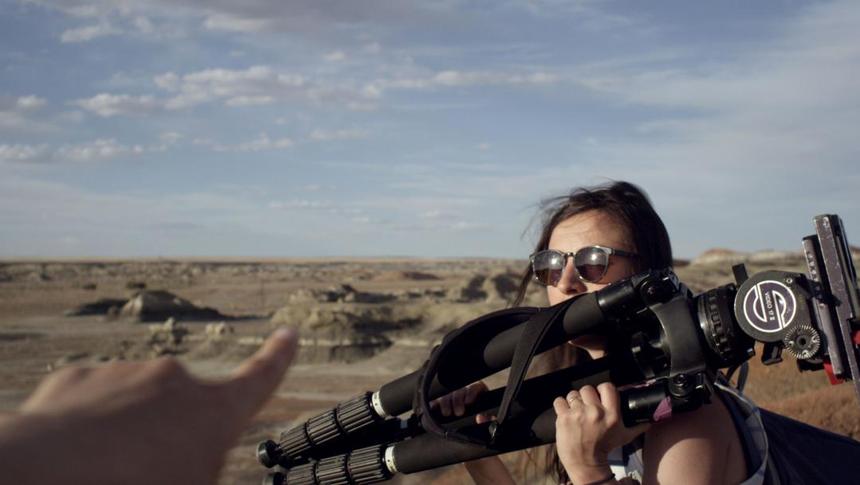Montreal Nouveau 2019 Review: L.A. TEA TIME, The Journey is the Destination

All artists have their heroes: the ones whose work we admire, whose work likely inspired their own, and whom they would give a lot just to spend an hour with to better understand their hero and inspiration. Much of this comes from an idea that there is some great work of art (a film, a novel, a painting) buried within us, and all it will take is just a few of the right words, for the light bulb to go on over our heads and our paths set. But what about the work of making art, and what about finding that inspiration and wisdom not from someone else, but from ourselves?
Québécoise filmmaker Sophie Bédard Marcotte explores her obsession with Miranda July, as well as her own approach to and creation of her art, in L.A. Tea Time. Obstensibly a documentary about the drive she and cinematographer Isabelle Statchtchenko take to hopefully meet July in Los Angeles, it becomes a combination of personal essay and meditation on not only the process of creating art, but the work behind how we create, how inspiration and ideas come to us, and how an individual artist finds their way to their story.
We meet Marcotte as she is setting up an installation of her video art at a local gallery; the first shot of two people travesring a great barren landscape turns out to be on a video, setting up the audience for what is literally and metaphorically to come. As she thinks about what her next work will be, she (appropriately) starts recording video messages for July, explaining her desire to meet in person. When she and Statchtchenko hit the road, it is with a quiet hope, with perhaps Marcotte still a bit unsure of what her success will be (she knows the chances of meeting July are slim).
Certainly not letting opportunity go to waste, Marcotte uses the road trip to meet people and gather stories. She tries dancing in a school football field in Missouri; she meets an old man in overalls at a strange junk store who sings a ballad of rednecks; she visits horse farms, the desert, churches, knows driving down a road in the middle of the night is the start of a horror film. On the surface, each just seems like a 'sketch', part of a series of vignettes designed to pass the time while they head out west for what is their true purpose as filmmakers and fans.
When Statchtchenko asks Marcotte what she is looking for on this trip, Marcotte answers her purpose in life. But the film is less about finding a purpose, and more about finding and understanding the process. That of discovery, of story, of how to piece all the different ideas in your mind and imagination together into something of coherence. As Marcotte's tale unfolds, what she discovers imparts to the audience, is that which might seem to be a series of unconnected moments, or stream-of-consciousness ramblings done to pass the time, are part of the creative process.
This isn't to say that Marcotte's stops along the way are not interesting or entertaining; they certainly are, and the filmearns its stripes as much as a quirky American road trip as a means to its more philosophical themes and explorations. Combining techniques of video installation art and documentary investigation, L.A. Tea Time is more than just a journey to meet a hero, or a journey to find one's self; it's a subtle process of finding the means to making sense of all the weird ideas we have rattling around our brains.







